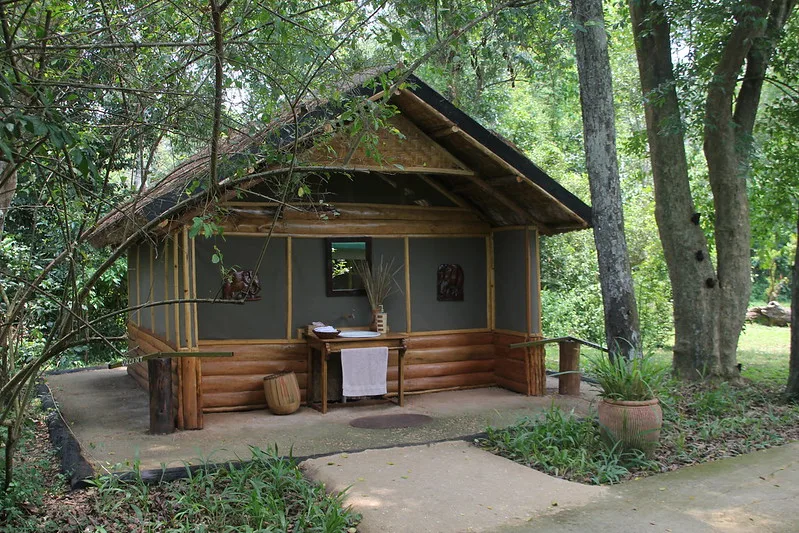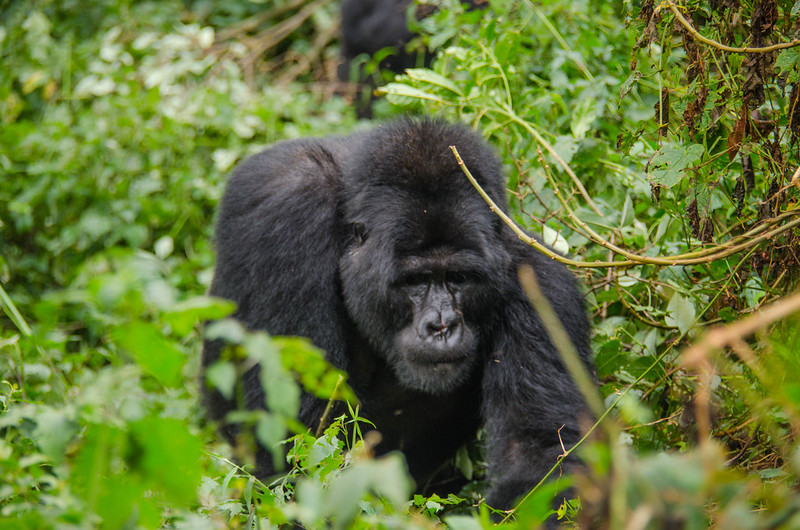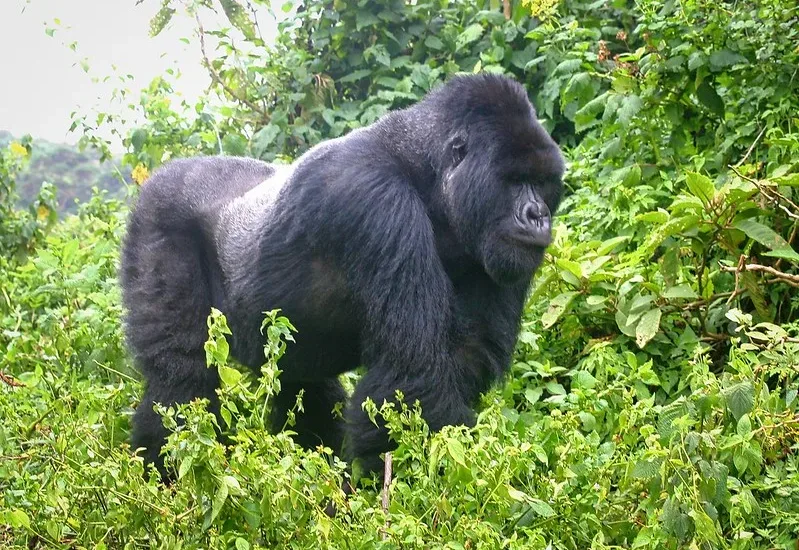Vous êtes bienvenus, aventuriers courageux, dans les merveilles sauvages de l'Ouganda, où l'appel de la…
The Batwa people -cultural Experience in Uganda.
Visiting the Batwa People in Uganda –The First People of the Forest.
These are extra ordinary people (Batwa) with their own version of existence. Many people out there were created with something unique about them like some people their heights favors them, others having flourishing land, to mention but a few but look at the Batwa People you may think most of these gifts ran short and there was no more left for them and by such they concluded being housed and sheltered by the Rain-forests. Look at this when they had been ejected by the government they believed God had forgotten all about them-impressive. So by visiting these Batwa people is good because that way you are helping to reserve and preserve their traditions and cultures alive. Not only that but still you are helping out on providing/offering income, infrastructure, providing support to the deserted & defamed first people of the forest.
The original people of the rain-forests – the Pygmies, these were the original residents of the montane rain-forests of Uganda, Rwanda, Burundi. They stayed/resided there, collected & startled in these forests for over 1,000 years. They lived and stayed in peace with their cherished forest, the wildlife involving the mountain Gorillas and there were no destructions of the forest, no making of charcoal, the environment was never distraught/bothered by their houses/shelters.
The ‘Twa in Rwanda’-Batwa Pygmies lived a meek and tuneful life with natural surrounding and no farming, livestock maintenance but always depended on the rain-forest for their existence only taking what was necessary and needed. They have a saying that goes- Batwa/a Mutwa treasures/adores the forest as much as he loves/adores his own body.![]()
Several Ugandans have a different conception about the Batwa people, they presume these people do kill Gorillas, but instead these people (Batwa people) have not done such an act and not even have they eaten the Gorillas, rather they have co-existed with these creatures for centuries. For any gorilla poaching/hunting that these people have ever done was due to the provocation of the Westerners and such took place before after their ejection from the forest. Money was used as an inducement.
But at present the Batwa people are now denounced as Gorilla killers/poachers and are eagerly censured for any poaching that takes place in any of the National parks (Bwindi Impenetrable or Mgahinga Gorilla).
Truly, the Batwa people were caretakers and defenders of the forest not until the Bantu people came along to the place. And it’s the likes of the Bantu who were cutting down forests, cropped and fed their cattle on the fields that were once their darling rain-forests. Batwa people co-occurred with the gentle giants(Gorillas), Chimpanzees and so many more animals plus the birds as well.
Batwa people used to honor the Tutsi king in various ways when Rwanda became a kingdom (the northern border of the kingdom is in present Uganda). These people were involved in court of the King’s advisers, dancers & warriors, not only that but they were also given permission to excerpt costs/payment from those intruding on the forest. Still they were also able to tariff caravans and traders coming through their place.
In 1991 the life of the Batwa people radically transformed and this is when Mgahinga Gorilla National Park and Bwindi Impenetrable National Park were recognized for the conservation of the forests, wildlife & primates such as the mountain Gorillas (endangered species). By 1992 whoever was staying and residing in the land of the parks (Bwindi & Mgahinga) plus the first people of the forest inclusive (Batwa people) were not remunerated at all not in form of land or money, nothing. And this was done at the firmness of the preservationists.
The farmers who were not from the Batwa and for years had smashed the so called Park-lands are the ones who were remunerated and got land rights, while for the Batwa the reverse is true, them received totally nothing yet they had for long protected the forest. The Ugandan Government completely never noticed them and their historical claims to the forest/land.
It’s very important to conserve forests in the parks, presently in the 21st century the forest would be no more if there was no Gorilla protection which guards the natural homes of these creatures, without Gorilla Tourism being the main basis of money for the protection work.
The places around Bwindi Impenetrable National Park and Mgahinga Gorilla National Park are highly populated and communities around would have relocated deeper into the parks to build houses, plant farms, destroy forests and the homes of these Gorillas.![]()
So since 1991, the Batwa people who co-occurred with wildlife, forests and the gorillas were completely left with nothing (no land-totally with no life of hunting and collecting).
On the other hand, these people (Batwa) are also citizens of Uganda, yet on the other hand they are people with no rights and remuneration for what they have lost. So at present they are residing outside their historical homes as trespassers at the sympathy of others. As outsiders these people (Batwa pygmies) were now a tribe without a personality/character, shrank to begging, rustling, stealing and working for others as servants who paid them a measly peanuts and not a great wage for their work. Now for this people having no land of their own and no skills to contend in this modern market place, they have become dis-regarded and so living in acute poverty on the National parks limits, looking in where they used to reside before.
Predisposition against the Batwa is intensely rooted in the rotating societies. It has caused many treat these people with no respect at all and they are considered lazy, robbers/thieves, pot smokers, drunkards and so on and this goes all the way to the government and all the rest of the surrounding world.
The non-Batwa people now deliberately refuse to marry the Batwa men and women. It is also normal and common that the Batwa men do rape the Batwa women and the same will damage the reputation of the Batwa. The non-Batwa people incorrectly believe that they would get healed of AIDS if they had sex with the Batwa women and this has led to giving birth of non-pygmy children into the community.
Not only the mentioned above but there is more like, the Non-Batwa don’t have meals with these people (Batwa people), there are unsystematic acts of violence and irritation being committed to these people. Clinics too don’t offer medical care to the Batwa that’s why the mortality rate of these people was so high and at a much younger & infant.
Later on, traditional habits like collecting and hunting were at the verge of being lost. So young people grew up in a world where they would hear the history of old but never encountered the traditions of the forest for themselves, all they witnessed was desolation and horrible poverty in which they grew.
The tradition of collecting, hunting, even of honey, traditional medicine, traditional abilities all were no longer imparted to the young generation belonging to the Batwa people because there is no entry/entree to the pre-historical forests.![]()
These people (Batwa) have gotten a trivial voice (their rights to speak out is still at a low level), but there are Batwa organizations existing and rising up within Uganda that are speaking out loud and creating a difference on their behalf. Their fantasy/vision is still to go back into the forest and stay in Co-occurrence with their environment and that involves the Mountain Gorillas where they hope is once again harmoniously exist with the wildlife, forest & these gentle giants (mountain Gorillas). Something which is most likely not happen, not now, not any sooner. The forest has contracted enough to be able to accommodate both people and the mountain Gorillas. Still there is a possibility that these Batwa people could infect these Gorillas with diseases most especially those habituated. Collecting/gathering in this forest could be another point to analyse in specific locations but not hunting.
At present there is a total existence of about 3,000 Batwa people and its true people can also become non-existent, however most concerned and different organisations are trying so hard to recuperate the old spirit of the Batwa people, their peaceful co-occurrence with the forest, the mountain gorillas and wildlife.
Foreign charitable Agencies like the one started by the American medical missionaries Dr. Scott and Carol Kellerman, who have devoted themselves to helping the Batwa People in southwest Uganda since 2002. The Kellerman’s procured land and established programs to mend conditions for the tribe—home-building, schools, a hospital (Bwindi Community Hospital) and clinics, water and sanitation projects, income generation, and the promotion of native rights.
These activities are now being presumed by the Batwa people and other native staff through the Batwa Development Program (BDP). It is reinforced by the Kellermann Foundation, a US-based charitable organization.
A Ray of Hope for the Batwa People – Visiting the Batwa People – the People of the Rain-forest in Uganda keeping the ways of old alive:
Though these people are not allowed to stay in the Forests that are part of the park make up and still though their traditions are hurriedly lessening since their ejection. However, things are altering, in 2011 Uganda Wildlife Authority supported by money from the United States Agency for International Development (USAID) and Netherlands Embassy in Kampala began the now-popular ‘Batwa Cultural Trail in Mgahinga Gorilla National Park’. Where families of the Batwa society led travelers/visitors through the forest in the shadows of the Virunga Volcanoes and taught the tourists about their primordial habits of hunting and collecting, and the Batwa Guides got to return to the Rain-forest and keep their cultures alive, at least in spirit. The Batwa societies also receive half of the Batwa Trail Fees. Tips are allowed.
The International Gorilla Conservation Programme worked hand in hand with the Batwa society and started the Buniga Batwa Forest Walk and village visit program- at the south side of Bwindi Impenetrable Forest. Buniga Forest is not part of Bwindi Impenetrable National Park. However, the vegetation, wildlife, and primates are alike, and one sights a few chimpanzees while engaged in the Forest Walk with the Batwa Guides keeping the tradition and cultural habits of the Batwa People alive.![]()
There is also the Batwa Encounter, which was initiated by the Kellerman Foundation outside of Bwindi Impenetrable Forest, and the half-day Batwa Encounter has profited the Batwa Community and those that made the Batwa Encounter a part of their time in the pre-historical Bwindi Impenetrable Forest.
Today Batwa Communities are profiting from tourism and making a living that enables them not to poach and turns them toward protection of the forest, wildlife and the Primates.
Below you will find 3 activities in South West Uganda where you can know more about the pre-historical Batwa cultures and traditions in their beloved Forest.
The Batwa Trail –Mgahinga Gorilla National Park
Mgahinga Gorilla National Park is a fine park, the setting that you experience as you tour with your Batwa Guides is magnificent. The Batwa Trail enables you to sight the forest via the eyes of the first people of the Batwa Pygmy people and enables them some expressive revenue that will make an alteration in their lives.
Take the Batwa Trail, find out more about the Batwa characters, end with dancing in the Garama Cave where a song of lamenting/howling, of not staying in the forest, is sang by the women. You, in turn, get to know more about the pre-historical habits of hunting and collecting that the Batwa People used and how they lived in the old forest.
Normally this trail covers about 5 hrs and the reviews of it are marvellous. The intention of this is for the genuineness as the Batwa People illustrate how they used to stay/reside here.
The Buniga Batwa Forest Walk
The Buniga Forest Walk with the Batwa people is close to Kisoro, easily accessed from the southern section of Bwindi Impenetrable Forest, such as Nkuringo/Rushaga from around Lake Mutanda/ Kisoro.
The forest walk here once again is very enlightening about the Batwa People and their habits, and this includes a tour to the village from which they come from and where you sight beehives and crafts made.
The African Wildlife Fund began this activity to help the Batwa society in this area and to stop them from poaching antelopes in the parks. Something that had to be resorted to endure. One must keep in mind that the Batwa are fully aware of the rates that tourists pay for Gorilla Trekking while they are barred from the forest, though a small percentage of resources are shared with them, often never reaching every society member. And another elevating encounter with the first people of the forest. This activity is a society program sponsored by the International Gorilla Conservation Programme.
The Batwa Encounter takes place just outside of the Bwindi Impenetrable Forest and involves hunting and collecting ways, but also about how the Batwa People used to stay, prepare food, collect their medicine from plants, roots, and bark.
The Batwa Experience at Buhoma
This Experience takes place in Buhoma section of Bwindi Impenetrable National Park and those who engage in this 5 hr plus venture love it and take with them some great memories. Any of the above Batwa Walks with the ancient people of the forest can easily be added on to any tour around Bwindi Impenetrable Forest or Mgahinga Gorilla Park.
Batwa cultural visits authentic
This is a time and again question. They are undeniably different from the proverbial Masai Village tour that several tourists have made in Kenya or Tanzania. It is a re-form as to how Batwa used to stay in the forest for thousands of years until they were ejected from them without any remuneration made in 1991 and 1992 becoming protection Refugees watching Gorilla Trekkers spend thousands of dollars while they, the Batwa were on outside looking in what was once theirs.
The Batwa tours enables visitors to view the forest via the eyes of the first people of the Forest. It is meaningful not only visitors but to the Batwa since it will enable them to preserve their culture alive in the 21st Century. It surely is not poverty tourism meant to induce pity from tourists. Most that participate are very happy that they met these people(Batwa) during their Gorilla Trekking activity in Uganda. We think that it is a way that fractional self-esteem is restored to the defamed Batwa People.


